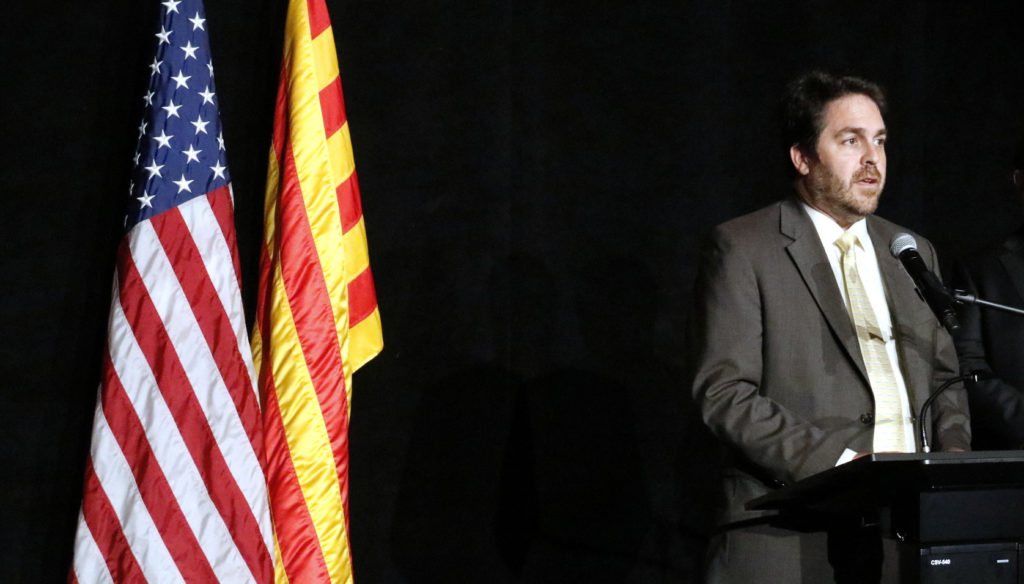05.05.2018 - 09:00
At the end of last year, the Spanish government took advantage of the article 155 excuse to close the delegations of Catalonia abroad (except Brussels) and Diplocat. In this way, a big nuisance for the Spanish foreign service disappeared and left Catalonia with no voice and no formal representation in the world, beyond small government offices and the untiring work of individual Catalans throughout the world. Since then, there has been talk of several initiatives to fill this gap, and it is in the United States where the first one is a reality: the Catalonia America Council. We talked about it with the former Delegate of Catalonia in the United States, Mexico and Canada, Andrew Davis, who is the Executive Director of this new organization.
– The Catalonia America Council has come to life: how would you define it?
We are an independent, nonpartisan, nonprofit organization with a dual mission of engaging with the most important political and social challenges facing Catalonia and North America, as well as to strengthening relations between them.
– This sounds pretty much like public diplomacy…
We believe that strengthening relations by definition must involve a strong public diplomacy component to be successful, so yes, we will be engaging in public diplomacy.
– What gave you the idea to create such an organisation?
It’s been something I and others have been considering for some time. Here in the United States there are many examples of organizations with a similar mission. Take for example the American Australian Association or the American Scottish Foundation, just to name two. They seek to strengthen relations beyond the formal institutional work that embassies or delegations do. Many of them do good work, and we thought Catalonia could benefit from a similar entity.
– In promoting bilateral relations between Catalonia and America, which fields will you focus on?
We have identified four pillars for our initial focus. The first pillar focuses on current events and contemporary challenges, where we will seek to engage on the latest social, political, and economic developments in Catalonia and North America. The second is benchmarking and international exchange, where we will work to encourage and promote transatlantic exchange between public, private and academic institutions. The third pillar is business and innovation, where we will promote private-sector collaboration and educate both communities on relevant business, trade, and legislative issues of interest to businesses in North America and Catalonia.
– And the last one?
The last one is journalism. The current global social and political climate makes the role of the press critical. We want to support Catalan and North American journalists and journalism in order to strengthen not only the transatlantic relationship, but also so that their subsequent work enhances the quality of their respective democracies.
– There are already some Catalan public organisations in America active in the business sector (ACCIÓ) or in the cultural one (IRL). Will you work together or what role will each one play?
As a private entity we will look to collaborate on various projects with public, private and academic institutions, depending on the priorities or project at any given time. But we have no desire to overlap or compete with Catalonia’s government agencies. They are doing a fantastic job, and have been for decades.
– Are there already any events or activities in the agenda?
Once we are finished with the official launch process, we will be announcing our first activities. Stay tuned.
– The CAC will operate on a budget exclusively based on private capital and donations. Why?
The CAC will function as a traditional American non-profit organization, which relies on private donations from those who support the organization’s work. It assures independence of action and synergy between members who seek to implement the organization’s mission and the organization itself.
– Is it easy to raise money for an organisation of this kind in the States?
Short answer: no! Fundraising is always a challenge and lots of organizations compete for donor’s attention and financial support. Our challenge will be to show that the Catalonia America Council is relevant, timely and effective. We are overwhelmed with the buzz that’s been created just in the 48 hours since we launched, and encourage people to go to our website to learn more and, if they like what they see, to support us.
– Nowadays the political tension between Catalonia and Spain is very high and many people consider that basic democratic values and rights are at stake in Spain. To inform the media and the public opinion in the United States about these issues will be also one of the Catalonia America Council missions?
Absolutely, in fact it is part of our mission statement to engage directly on both communities’ most important political and social challenges, and this is clearly one of them. As we’ve said publicly, our organization is guided by what we consider to be the values that Catalans and Americans share: an unwavering support for freedom, democracy and self-government, and a common entrepreneurial, pull yourself up by your bootstraps spirit. In that context, we believe that the existence of political prisoners, forced exile, curtailments of freedom of speech, and of assembly, are anathema to those values. We therefore strenuously condemn them, and will work to encourage debate and propose solutions.
– Even if it might not make the Spanish ambassador very happy?
We don’t seek to be provocative for the sake of being provocative, but we believe that the only way to address the thorniest questions of the day is to address them head on.
– You have been the delegate of the Catalan Government to the USA from 2008 to 2017, until the Spanish Government decided to close all Catalan delegations abroad and depose you. You don’t expect the new Catalan Government to call you back to your old position once it is formed?
Representing the Government of Catalonia in the US for eight years was truly the honor of my life. I served four legislatures and three Presidents, and inaugurated both the New York and Washington delegation offices. I was lucky enough to count on a wonderful team of professionals that did an incredible job under difficult circumstances, and I consider the closure of the office an abuse (one of many) of the application of article 155. That said, after eight years I think that chapter in my life has passed. But I am still excited to support the transatlantic relationship, albeit in a different way, and I think the Catalonia America Council is a great way to do so.
– Can the Catalonia America Council substitute the role and the task of the Delegation?
Absolutely not. The Government needs its institutions and to have its representative offices, and I hope that the delegation can be reestablished soon. Meanwhile, the Catalonia America Council will work hard to strengthen the transatlantic relationship between Catalonia and United States, but from outside of government. The two efforts are not mutually exclusive.



